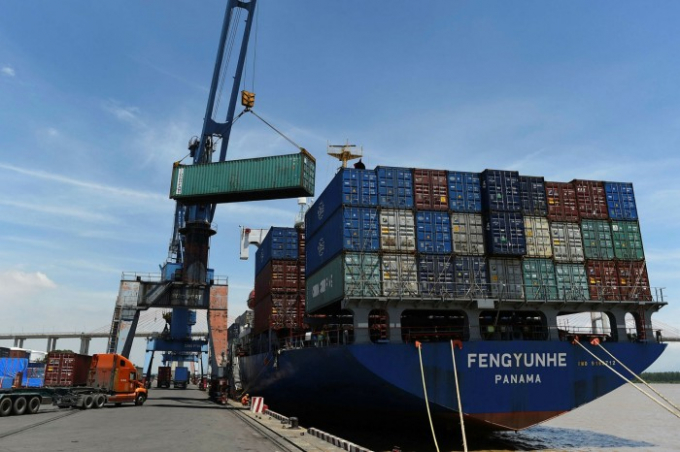June 2, 2025 | 11:34 GMT +7
June 2, 2025 | 11:34 GMT +7
Hotline: 0913.378.918
June 2, 2025 | 11:34 GMT +7
Hotline: 0913.378.918

Scope 3 emissions: for companies with vast supplier networks, reducing their carbon footprint is complex, requiring special expertise. Photo: AFP
As companies grapple with how they can reach net zero carbon emissions by 2050, consulting firms are engaged in a struggle of their own: to develop the skills to meet rising demand from clients seeking sustainability advice.
“They need an awful lot more people and it’s coming at a time when they’re not just short of sustainability skills — they’re short of every kind of skill,” says Fiona Czerniawska, chief executive of Source Global Research, a data provider on the professional services industry.
In findings that were not limited to sustainability, Source Global Research recently found that one in five consulting firms said they were turning work away because they did not have the right skills.
Neelam Chohan, associate client partner at Korn Ferry, the organisational consultancy, says the firm has been hiring more people for its sustainability teams in the past year “simply because demand is very high”.
The additional challenge for consultancies is that helping clients meet net zero goals — to cut their greenhouse emissions to levels in line with the Paris climate accord, and offset those they cannot eliminate — requires a wide range of advisory expertise, as well as the technical support of sustainability specialists.
“The net zero work is spread across two different types of consulting services,” explains Czerniawska. “There is clearly work that’s explicitly focused on that, but there’s a lot of net zero work that’s embedded in other services.”
One example is supply chain management. For many clients, Scope 3 emissions — those that lie outside their control, including in the operations of suppliers — can represent the bulk of their carbon footprint. But, for companies with vast global networks of suppliers, reducing this footprint is complex and calls for advice from those with supply chain expertise.
Clients may also want risk management experts to advise them on how to prevent the effects of rising temperatures from hurting their operations. “Risk from climate change is making companies think about how they’re structuring the business,” says Jonquil Hackenberg, global head of sustainability and climate response at PA Consulting.
And, as with the integration of digital technologies across operations, the transition to low-carbon business models often prompts clients to seek advice on how to make shifts in organisational strategy.
“It’s how you implement transformation and change management, no matter what it is you’re deciding to do,” says Chohan.
With net zero and sustainability concerns touching so many aspects of corporate operations, firms need to ensure that consultants in all practice areas — from energy, financial services and risk management to human resources — understand the climate challenge and its implications for the business.
“You need a multidisciplinary approach to solving these kinds of problems,” says Hackenberg. “The challenge and opportunity is bringing different skill sets into one room.”
For consulting firms, one way of doing this is internally, through new forms of leadership and professional development. For example, Oliver Wyman has three co-leaders, each with different industry experience, for its climate and sustainability work.
“One comes with a background in financial services and risk, one with a background in the energy industry and I come from [one] in corporate narratives and consumer branding,” says Simon Glynn, one of the co-leaders. “All those different disciplines are relevant to climate.”
As well as running specialist training, Oliver Wyman has integrated climate content into the training models consultants receive at different stages of their careers. “Climate and sustainability are embedded as part of the toolkit a consultant should have,” says Glynn.
In expanding their sustainability capabilities, another option for firms is acquisition. In January, for example, Oliver Wyman acquired Azure Consulting, a Perth-based firm with expertise in energy and natural resources.
One advantage firms have in attracting talent is the enthusiasm of graduate recruits to work on practical sustainability projects. “What’s exciting is that you’re solving problems together rather than creating another PowerPoint [presentation],” says Hackenberg.
However, Czerniawska says there is no substitute for the right skills. She cites the push to reduce plastic waste: “You need people who really understand how to get rid of plastic and not just people who think it’s a nice thing to do.”
Even so, argues David Gillespie, Oliver Wyman’s head of UK & Ireland, passion is important. “You absolutely need the hard skills,” he says. “But you do want people for whom this matters. When someone is committed to something, you get that extra 10 to 20 per cent.”
(Finacial Times)

(VAN) Vikas Rambal has quietly built a $5 billion business empire in manufacturing, property and solar, and catapulted onto the Rich List.

(VAN) Available cropland now at less than five percent, according to latest geospatial assessment from FAO and UNOSAT.

(VAN) Alt Carbon has raised $12 million in a seed round as it plans to scale its carbon dioxide removal work in the South Asian nation.

(VAN) Attempts to bring down the price of the Japanese staple have had little effect amid a cost-of-living crisis.

(VAN) Fourth most important food crop in peril as Latin America and Caribbean suffer from slow-onset climate disaster.

(VAN) Shifting market dynamics and the noise around new legislation has propelled Trouw Nutrition’s research around early life nutrition in poultry. Today, it continues to be a key area of research.

(VAN) India is concerned about its food security and the livelihoods of its farmers if more US food imports are allowed.